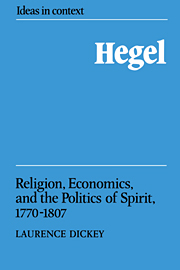Book contents
- Frontmatter
- Contents
- Preface
- Acknowledgments
- Introduction: Hegel in a Protestant cultural context
- Part I Hegel's Württemberg: “Civil Millenarianism” and the two faces of Protestant civil piety
- Part II Württemberg's Hegel: Applied theology and social analysis
- Part III Toward the Phenomenology: Sittlichkeit becomes a problem in social and political theory
- Epilogue: Bildung and politics: The “first class,” Christian pride, and “absolute spirit”
- Abbreviations
- Notes
- Index
Introduction: Hegel in a Protestant cultural context
Published online by Cambridge University Press: 11 January 2010
- Frontmatter
- Contents
- Preface
- Acknowledgments
- Introduction: Hegel in a Protestant cultural context
- Part I Hegel's Württemberg: “Civil Millenarianism” and the two faces of Protestant civil piety
- Part II Württemberg's Hegel: Applied theology and social analysis
- Part III Toward the Phenomenology: Sittlichkeit becomes a problem in social and political theory
- Epilogue: Bildung and politics: The “first class,” Christian pride, and “absolute spirit”
- Abbreviations
- Notes
- Index
Summary
Any number of students of Hegel's thought have noted that he grew up in a Protestant culture. Few of these students, however, have thought it necessary to explain how different one Protestant culture could be from another among the congeries of states that comprised “the Germanys” in the eighteenth century. That, I think, is because most scholars have rather uncritically accepted the argument that Hegel's idealism is “the last great expression” of a German cultural tradition that has its religious roots in Protestant “inwardness” and its political roots in subordination of the individual to state authority.
In this introductory chapter, I wish to show how misleading this view is as a point of departure for the study of Hegel's thought. Although in some general sense Hegel's origins were indeed German Protestant, they were rooted more specifically in a Protestant culture that, because it was ruled by a Catholic duke, could neither counsel nor countenance the values that governed the relation between religion and politics elsewhere in Germany. On the contrary, for most of the eighteenth century the Protestant culture of Old-Württemberg was governed by an ideal of civil piety that required extensive political vigilance vis-à-vis an absolutizing and catholicizing duke. It is the dynamics of this particular Protestant culture, not some “global” German one, that we need to reflect upon if we are to understand Hegel's origins. The argument of this chapter moves toward that end.
The “old man” as schoolboy
The first twenty-four years of Hegel's life have posed something of a problem for students of his thought.
- Type
- Chapter
- Information
- HegelReligion, Economics, and the Politics of Spirit, 1770–1807, pp. 1 - 32Publisher: Cambridge University PressPrint publication year: 1987

